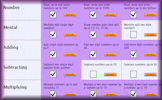Levels
Click on one of the levels above to see the content of the syllabus and the Transum resources for this course.
Suggested
Number Skills Inventory A checklist of basic numeracy techniques that every pupil should know.
The short web address is:
Transum.org/go/?Num=442
|
In the UK, Functional Skills Maths courses are designed for learners of
various backgrounds and ages who wish to improve their mathematics skills.
These courses are particularly suitable for:
- Students who have not achieved a Grade 4 (previously Grade C) or
higher in GCSE Maths: This is often a key requirement for many jobs and
further education courses. Functional Skills Maths provides an
alternative qualification that is recognised by employers and
educational institutions.
-
Adult learners returning to education: For adults who may not have
had the opportunity to gain formal qualifications in the past,
Functional Skills Maths offers a chance to develop essential numeracy
skills needed for everyday life, further study, and employment.
-
Learners in vocational training and apprenticeships: Functional
Skills Maths is often a component of apprenticeship programmes and
vocational qualifications. It helps learners apply mathematical concepts
in practical and workplace contexts.
-
Individuals seeking to improve their life and work skills: Beyond
academic and vocational requirements, these courses cater to individuals
looking to enhance their practical maths skills for everyday use, such
as managing finances, problem-solving, and decision-making.
-
Students with special educational needs: Some learners may find the
format and content of Functional Skills Maths more accessible than
traditional GCSE Maths, making it a viable option for those who require
a different approach to learning.
Functional Skills qualifications are designed to be flexible and
accessible, allowing learners to study at their own pace and in a way that
suits their individual learning needs and circumstances.
|